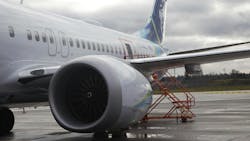Boeing Tackles Traveled Work, Commits to Safety
Speaking at the Bank of America Global Industrials Conference on March 20, Brian West, Boeing’s chief financial officer and executive vice president of finance, gave an update on the company in the wake of recent incidents plaguing the aerospace manufacturer since the Jan. 5 mid-flight dislodging of a door plug from a Boeing 737-9 MAX aircraft.
West began by saying the company is “fully committed to transparency and accountability with our regulators. The FAA is deeply involved and undertaking a tougher audit than anything we've ever been through before.
“There's changes that need to happen. There's no doubt about it,” he added.
He continued saying that the Jan. 5 incident showed Boeing that it needs to “improve upon safety and quality and conformance.” He highlighted traveled work as major area of concern.
“Traveled work has existed for a very long time and in recent years, we tried to get ahead of it. Turns out it wasn't enough,” West said.
Indeed, travel work has been a significant issue for Boeing since at least 2008, when it seriously hampered production of the 787 Dreamliner.
Generally, traveled work is defined as work, components or assembly processes that are not completed at their originally planned stage or location within a production line. As a result, these items need to be moved to a different stage or location for completion.
For years, West said, Boeing prioritized the movement of their aircraft through the factory over getting it done right.
“That's got to change. The leadership team got it in the immediate aftermath of January the 5th. We control how this happens, and it's about our resolve to get ahead and get after traveled work,” he continued. “Our CEO is calling for a step change improvement in how we think about traveled work.
West said that as of March 1, Boeing no longer travel work between Wichita (at their fuselage supplier) and Renton.
“It had been going on too long. So now, we will only accept a fully conforming fuselage from Spirit,” West said.
At the mention of Spirit AeroSystems, West reaffirmed Boeing’s “conviction” to repurchase the manufacturer and supplier but provided no timeline for the possible acquisition.
“We believe, and Spirit believes, that reintegrating these two companies is what's best for safety and for quality for the aerospace industry. We have conviction on that. And without going into synergies and efficiencies, it's really about focus and running that business, not as a business, as a factory. Run it as a factory and stay focused on safety and quality and stability and that opportunity sits there,” he said.
About the Author
Walker Jaroch
Editor
Contact: Walker Jaroch
Editor | AMT
+1-920-568-8399
>> To download the AviationPros media kits, visit: Marketing Resource Center
>>Check out our aviation magazines: Ground Support Worldwide | Airport Business | Aircraft Maintenance Technology


